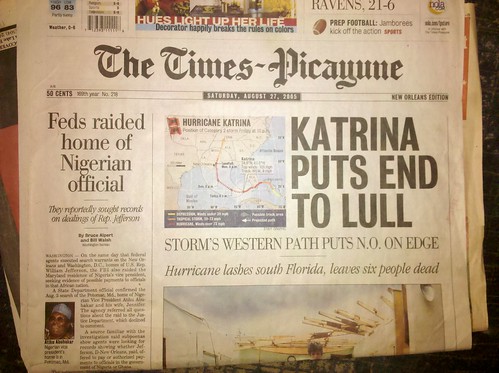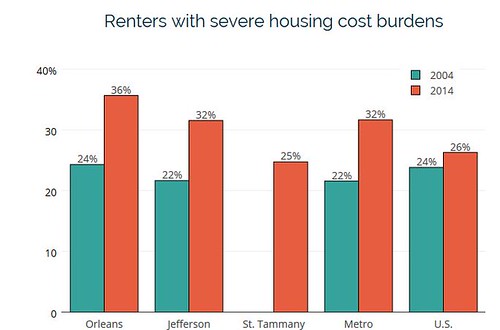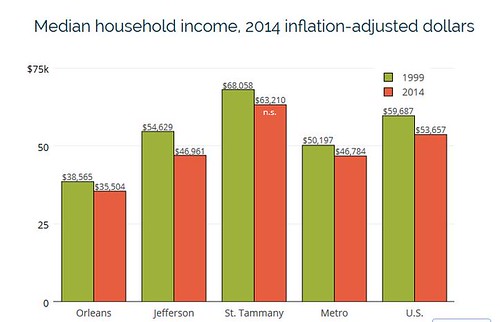
We spent so many months remembering Katrina last year that today's subdued remembrances are not only appropriate but, frankly, welcome. The commentary is also subdued. The Advocate and T-P each ran "pay it forward" type editorials about the situation South Louisiana finds itself in in the wake of this year's flood. That seems most appropriate. That sentiment is repeated in a short post by Stephanie Grace here. Clancy Dubos offers advice to flood victims in his Gambit column this week.
Here is a more general Katrina remembrance by Bob Mann.
The papers also are running a low key series of progress reports. Here is one about public transit.
This one is about recovering urban plant life.
This one is a bit different. It's from a brief article by Gary Rivlin, the author and journalist who spoke at the tenth Rising Tide conference last year.
Katrina was not an equal opportunity storm. A black homeowner in New Orleans was more than three times as likely to have been flooded as a white homeowner. That wasn’t due to bad luck; because of racially discriminatory housing practices, the high-ground was taken by the time banks started loaning money to African Americans who wanted to buy a home.Here at the old Yellow Blog, we've been talking about that very story for over a decade now as we, as a local polity, have largely failed to make the inevitable "recovery" of New Orleans an equitable one. Rivilin's post references the Data Center's latest "Who Lives In New Orleans Now" report. There we find the heart of our failure in two graphs.
Nor has New Orleans experienced an equal opportunity recovery—in no small part because of the white civic leaders who openly advocated for a whiter, wealthier city. While water still covered most of New Orleans, Jimmy Reiss, a prominent local businessman and then-head of the Business Council, told the Wall Street Journal that the city would come back in “a completely different way: demographically, geographically, and politically,” or he and other white civic leaders would not return. That sentiment was paired with a policy approach then-Congressman Barney Frank described as “ethnic cleansing through inaction.”
Here is the change in renters with severe housing cost burdens.

And here is the change in median income.

The median income for renters in Orleans Parish, by the way, is even lower. $24,773 according to this study.
If that's not depressing enough, consider also that now since we've reached the post-post-Katrina era of new New Orleans, the worst of our failures are calcifying into a more permanent new normal. Last year, during August, I went around town revisiting places I'd taken photos of during the first couple of years before Katrina. The result was this series of posts. Looking back through those yesterday, I think it was this part that I most wanted to re-emphasize.
Here is something Troy Gilbert posted earlier this month that got my attention. It's a previously unpublished interview with Chef Greg Picolo about his post-Katrina experiences. There's a paragraph toward the end where Picolo talks about how the flood changed his outlook on civic life to a degree.I worry more now than ever that we're losing that sense of community. The new normal New Orleans is defined more by "stay-in-your lane" stratification than grass roots organization. Traditional divisions reappear. Press and politics take a dimmer view of reader feedback and public input. Social media has evolved in such a way that it is more likely to fragment communities into walled off cliques than connect them across social and professional boundaries.
Asked how he was changed by the entire experience, the Chef answers quickly, “That Greg doesn’t live here anymore. Before I led a very monastic lifestyle. I kind of broke out of the tunnel vision I had before. Today, I have more of a need to connect with people. I needed to lose some of my control. I’m easier going. I have zero patience for bullshit, and now I just don’t get bogged down with stuff.”I'm certain I am not alone in saying this really hits home. It might be the common denominator of everyone's experience rebuilding New Orleans. When we got back, we were shaken out of our silos. Each of us in some small way at least had to look around to see who our neighbors were. Who else was here? Who could help? How could we help them? Entire new networks were stitched together out of parts that just weren't possible to bring together before.
I wonder, though, if ten years later, we're starting to sink, bit by bit, back into our own tunnel visions of life in a new New Orleans. As we put the recovery "behind us" is receding from the tighter cross sectional communities we built during that process a good idea? Why might this be important?
We've failed in so many ways to achieve social justice in New Orleans after the flood. Are we destined to lose our post-K social networks as well? Katrina may have ended the lull for a while. But it turns out the lull was resilient.
No comments:
Post a Comment